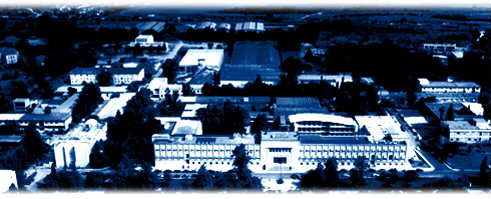
A presentation of the
National Laboratory for Civil Engineering (LNEC)
Laboratório Nacional de Engenharia Civil (LNEC) in Lisbon, Portugal, is a public research institute encompassing virtually all branches of civil and materials engineering, including the conservation of the built heritage.
LNEC was founded in November 1946 but incorporated a materials testing laboratory founded in 1898 and may thus claim an older ancestry. The library of that first laboratory made up the original bibliographic core of LNEC and so its library, the largest of its kind in the country, includes a wealth of XIX century publications that are today an important resource for studies in the conservation field.
LNEC is a leading organization in several fields including, for instance, earthquake-resistant structures. Its 40ton 3-degree of freedom shaking table, which was designed in-house, is used by researchers from all over Europe. LNEC has a long experience in laboratory and field experimental research, physical and mathematical modeling, and assessment of risk and evaluation of safety conditions of all sorts of engineering works.
Trainees receive a scholarship funded or co-funded by LNEC. Their training includes the participation in research projects, laboratory work and field work- usually within the scope of contract work for paying clients, public and private alike. A project will eventually be chosen for a thesis at the M.Sc. level. Several years later a major project will likewise be chosen for a thesis at the Ph.D. level. All theses are presented at universities, in Portugal or in any country where the best conditions of technology and know-how may be found. After obtaining a Ph.D. degree the trainee may finally apply to become a LNEC researcher. During his career he will be trusted with increasing responsibilities in the management of research and contract projects and will go on to eventually try for career advancement based on an independent examination of his curriculum and on the defence of a major research proposal.
Present workforce is of about 700 employees, of which around 300 have education at university level and 150 are LNEC researchers.
The modern and sizable testing facilities at LNEC are at the disposal of external researchers and research teams to develop projects within the scope of LNEC Programs.
The EU-ARTECH team.
The activities of the EU-ARTECH project are mainly carried out in the Materials and Geotechnique Departments. To carry through the necessary research activities, both departments have facilities for physical, chemical and durability characterization. Physical tests include porosity, bulk and real densities, swelling, specific surface, pore size distribution, thermal expansion, capillarity, water vapor permeability, microdrops absorption, contact angle, ultrasonic velocity, drilling resistance etc, and mechanical characterization through the use of quasi-static force (over two dozen presses of different sorts and capabilities are available). Physical and analytical chemistry means include XRD, FTR, HPLC, XRF. Several types of ageing tests are currently performed, as well as petrographic and SEM observation for the analysis of rocks, soils, metals and several other media
The research team allocated to this project has significant experience in the field of materials conservation and its members have been involved in several projects covering different aspects of the conservation of cultural heritage, among which:
-STEP CT90-110 "GRANITIX - Conservation of granitic rocks with application to the megalithic monuments";
-BRITE/EURAM BRE CT93-560 "LAMA - Laser portable pour le nettoyage des façades courantes et des monuments";
-SM&T CT95-2065 "HARDROCK - Development of a new measurement method to determine the superficial hardness of exposed monumental rocks";
-SM&T CT98-2262 "ONSITE - On site monitoring of biological colonization of stone and plaster surfaces using field portable fluorescence based techniques";
-CT 2001-0047 "COMPASS - Compatibility of plasters and renders with salt loaded substrates in historic buildings";
-CT ICA3-2002-10051 "PRODOMEA - Dealing with incompatibility in archaeological sites".
LNEC has a long research experience on themes related to the conservation of the built cultural heritage and its researchers participate on a regular basis in consulting work at the request of public and private parties.
Dr. José Delgado Rodrigues, Geologist, LNEC Principal Researcher (Ret), is the leading LNEC scientist for the EU-ARTECH. Some other members of the team are: Manuela Salta, Chemical Engineer, LNEC Principal Researcher and Division Head, specialist in metal corrosion, Ana Paula Ferreira Pinto, Civil Engineer, Assistant Professor at the Tech University of Lisbon, João Manuel Mimoso, Thermodynamics Engineer, LNEC Principal Researcher and Division Head, Rute Fontinha, Chemical Engineer and LNEC Research Trainee.
